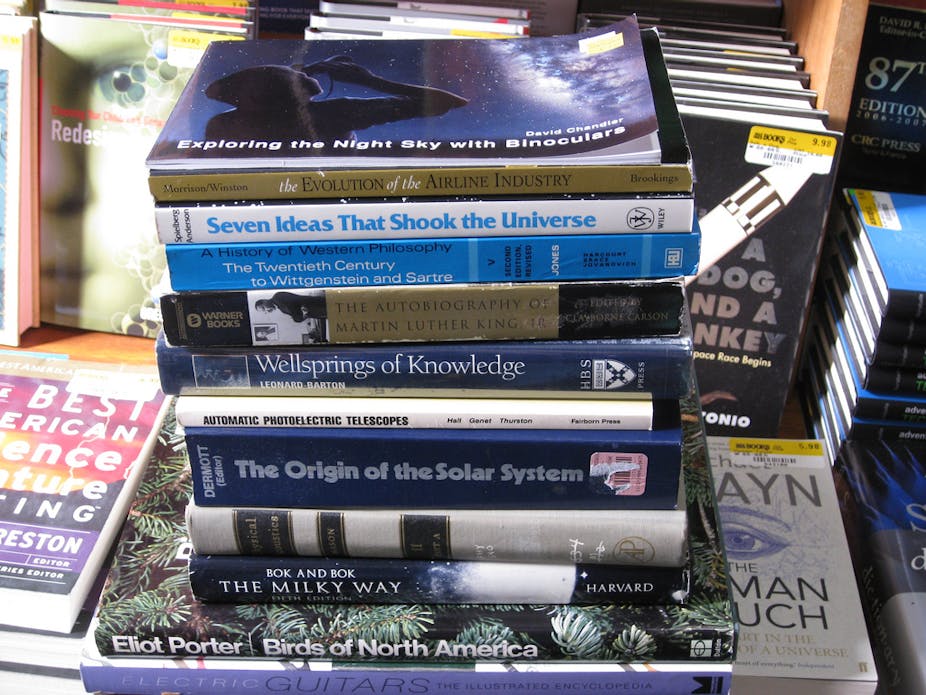Do scientists have a language problem? Do policy makers have hearing issues?
It would certainly seem so. Of late there have been frequent lamentations about scientists’ failure to make their case to the public on hot-button issues, or of policy makers to listen to their input.
Often scientists and the public are, in fact, communicating, but they’re talking right past one another. So what’s going on?
Words, words, words
It’s imperative scientists do a better job communicating the meaning of the words they choose.
I don’t mean jargon: I mean basic words that mean one thing in scientific circles and another to the wider public.
Let’s take the climate change debate, and focus on a few specific words in context.
1) Theory: “Climate change is just a theory”
In science effectively all ideas are “just” theories.
Scientists often use concepts from the philosophy of science to make some semantic distinctions between laws, theories, hypotheses, and the like.
So when a scientist talks about a “law” of nature, he or she is referring only to a standard observation (given some strict parameters), not an absolute requirement.
A basic principle in science is that any law, theory, or otherwise can be disproven if new facts or evidence are presented.
If it cannot be somehow disproven by an experiment, then it is not scientific.
Take, for example, the Universal Law of Gravitation.
This “law” describes the motion of heavenly bodies, and how we stay firmly planted on the ground.
But this “law” is in fact not always right – it just captures what we usually observe.
In this case, we are ultimately referring to the “theory” of gravity – a theory supported by a huge body of evidence, but still just a theory.
The same is the case for human-induced climate change.
2) Proof: “We can’t prove humans are causing climate change.”
When people ask for proof, they generally just mean “evidence”. Scientists may have lots of “evidence”, but will never claim to have “proof,” because proof does not exist in science.
Proof has a technical meaning that only applies in mathematics.
All we can do in science is collect evidence – lots of it – much the way we do in testing gravitational theory.
So long as the evidence is consistent with the theory, we consider the theory validated. But it will never be proven.
A critic or sceptic may view a scientist’s hedging on the issue of “proof” as a sign of weakness – really it’s just a sign the scientist’s meaning of the word is different to the general public’s.
3) Uncertainty: “Even proponents of human-induced climate change admit uncertainty.”
This use of “uncertainty” is perhaps the stickiest issue. In the public mind, uncertainty suggests someone is confused or otherwise not fully in command of the material.
But in science, uncertainty is always present…because nothing can be proven.
Is this a bad thing? No.
A scientist cannot and will not say there is absolute certainty that you won’t fly off into space due to a quirk of gravitational theory, quantum mechanics, or the like.
He or she would simply say that such an occurrence is extraordinarily unlikely – so unlikely that it wouldn’t, on average, happen even once during the age of the known universe. Even though that’s really unlikely there remains uncertainty.
In the climate change debate the uncertainty is much larger than in this example, but it is fundamentally no different to the scientist’s mind.
A winning formula
The burden for fixing this communication problem falls most heavily on the scientist. We need to better educate the public about the meaning of our words, and of the basic principles of science. We fail when we assume that everyone thinks or argues the way that we do.
This is a huge challenge in an age of 24-7 news channels that are looking for three-word soundbites.
No-one wants to diminish the accuracy of our statements. But even accommodating the modern media cycle is possible.
So how about this?
In science …
Everything’s a theory.
Proof doesn’t exist.
Nothing is certain.

